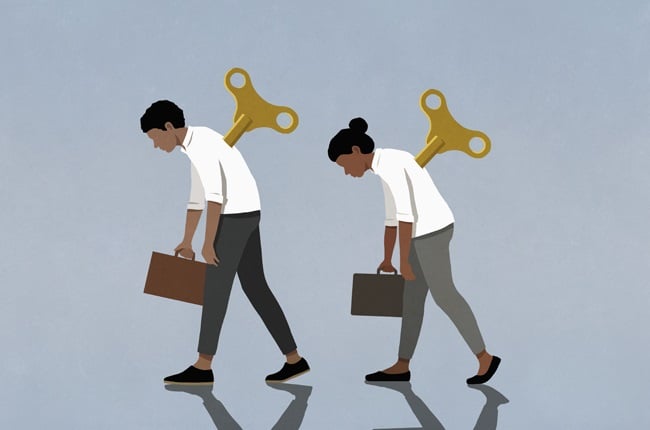
- If you're constantly feeling exhausted and struggling to cope in your work and personal life, you could be suffering from burnout.
- Burnout is a condition now officially recognised by the World Health Organisation, but how much do we know about it, its causes, and symptoms?
- Marilize Jacobs and Maritha Broschk delve deep to uncover the reasons people suffer from burnout.
Do you constantly feel exhausted? Do you struggle with sleep? Do you feel that you are not coping at work? Do you generally feel unwell, perhaps even battling high blood pressure, frequent headaches and stomach issues such as cramps and diarrhoea? You might just suffer from burnout, a condition officially recognised by The World Health Organisation (WHO).
In 2016, a general social survey in America reported that - compared to approximately twenty years ago - people were twice as likely to admit that they were always exhausted. In fact, close to 50% of the respondents said that they were continuously exhausted due to challenges at work – a shocking 32% increase from two decades ago. A meaningful correlation between isolation and exhaustion was noted: the more exhausted, the lonelier people tend to feel. And as people increasingly feel more alone and marginalised, they become silent, depressed and even more anxious.
Research conducted by Sarah Pressman, award-winning associate professor of Psychological Science at the University of California, concluded that while obesity reduces life expectancy by 20%, drinking excessive amounts of alcohol by 30%, and smoking by 50%, loneliness shows a staggering 70% reduction. One study suggests that loneliness even increases your risk of stroke or coronary heart disease by 30%. On the flip side, social connection can strengthen our immune system, leading to a longer, calmer and happier life.
READ MORE | Why 'finding your purpose' matters -- and four ways to find yours
But what exactly is Burnout?
Contrary to popular belief, burnout is not merely exhaustion, even though overwhelming tiredness is most definitely one of the main symptoms. According to Dr Christina Maslach, a leading burnout researcher and author of the book The Burnout Challenge: Managing People's Relationships with Their Jobs, the following core factors contribute vastly to burnout on the job, namely:
-A significant time period of feeling exhausted, listless and demotivated at work.
-Feeling cynical and having a negative attitude towards work projects.
-Experiencing a sense of disassociation from these projects and from the people around us, such as co-workers, friends, and family.
In short: burnout makes us feel ineffective, as though we're accomplishing significantly less than usual and can't muster the fortitude to be productive. Another interesting fact: when you stress, you crave salty or sweet snacks. Why? Some say it induces the hypothalamus to release dopamine*, which in turn makes you feel good and relieves stress!
Ultimately, the primary cause of burnout at work (and life in general) is an overwhelming amount of chronic stress.
Maslach identifies the following sources:
- A heavy workload.
- Personal values not being aligned with that of the company or institution one works for.
- Inadequate rewards for performance.
- Lack of control stemming from micromanagement, disrespect and feeling that one's personal input is not welcomed or valued.
- Not being treated fairly and noticing favouritism.
READ MORE | Dating app burnout is real - here's what you can do to combat it
Added to that is a lack of that sense of belonging we as social beings crave. Professional relationships contribute enormously to minimising burnout and boosting engagement. The weaker our relationships and the more conflict we experience, the more likely we are to burn out.
While burnout is traditionally defined as an occupational phenomenon, the ongoing stressors we face at home can also count toward our total level of chronic stress. The bottom line is this: The more chronic stress we face, no matter where it's coming from, the closer we get to burning out.
Where to from here?
Dr Juanri Jonck is a medical doctor at lifeLAB, Pretoria, with a special interest in aesthetics, hormone optimisation, nutrient therapy and lifestyle improvement. She has treated many patients for adrenal fatigue over the years and states that burnout manifests on a physical as well as emotional level. However, these elements become inevitably intertwined. "Stress, whether emotional or literally running from a lion in an attempt not to die, plays a very big role in generalised fatigue because cortisol triggers the release of glucose from your liver to give you the fight or flight response," says Dr Jonck.
"This, in turn, influences your insulin levels. If over time, people suffer from this chronic stress response without adequate sleep, it can lead to the physical part of burnout."
Dr Jonck explains that, in extreme cases, depleted cortisol (the primary stress hormone released by the adrenal glands that helps us recover from the effects of stress) and aldosterone (a hormone also released by your adrenal glands that helps regulate blood pressure) can lead to Addison's disease. As the body makes too little cortisol, this can be life-threatening and typically presents with darkening of the skin, severe fatigue, weight loss and dehydration, to name but a few.
How to combat Adrenal fatigue
According to Dr Jonck, we must have a good hard look at our gut health before we start blaming our adrenals. "Many of my patients actually suffer from chronic inflammation caused by a diet which does not support the gut bacteria.” She specifically points to eating foods high in refined sugar. "This leads to fatigue simply because the body needs to divert so much of its energy to fighting the constant inflammation."
Brain fog is another symptom that her patients frequently complain about. And that impacts cognitive thought and creativity. "Since your brain takes up about 20% of all the energy created in your so-called mini power stations, energy depletion or mental load shedding will have a significant and negative effect on your creative expression and ability to generate fresh and original ideas."
Eating foods high in fibre and antioxidants, such as vegetables, beans, and legumes, are at the top of the anti-inflammatory pyramid. Even dark chocolate (sparingly) and red wine – albeit NO more than one glass a day. Taking supplements such as probiotics and prebiotics will aid gut health, whereas adaptogens such as Ashwagandha and Rhodiola support your adrenal glands.
A simple yet crucial tip many of us have heard repeatedly but still struggle to follow is getting adequate sleep. But make sure that you get 7.5 to 9 hours of sleep. Yes, the 6 – 8 hours rule is archaic and outdated. "Each circadian cycle lasts about 1.5 hours. Less than 7 hours of sleep have been linked to weight gain, diabetes and heart disease, to name but a few," says Dr Jonck. "So, if you do the math, the perfect minimum equals 5 cycles or 7.5 hours of quality sleep."
On the emotional side, a lot of experts also stress (pardon the pun!) the importance of meditation to create a feeling of calm and connectedness. Burnout needs to be treated holistically – in body and in mind.
READ MORE | Quiet Quitting is a slow death to everyone concerned - here's how to curb this detrimental behaviour
Conclusion
Recognising the connection between burnout, adrenal fatigue, and loneliness is crucial for creating a healthier work (and home) environment and leading a healthy yet productive life. As Arianna Huffington, Founder of the Huffington Post, used to say: "Burnout is not the price you have to pay for success; it's what happens when you forget to take care of yourself."
So, there you have it. A few important yet simple tips to follow in order to prevent or treat burnout. And if you actually read to the end of this article, it is already a good sign. But now we shall let you rest. Don't forget what we said about the chocolate (wink).
Marilize Jacobs and Maritha Broschk are busy momtrepreneurs in the creative industry. They are interested in "working to be happy and happy to be working" by adopting a lifestyle that promotes physical, mental and emotional well-being.




 Publications
Publications
 Partners
Partners












